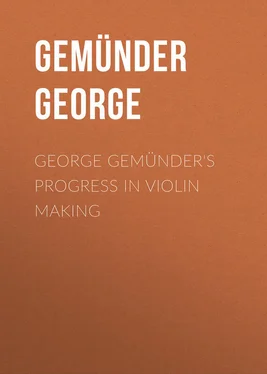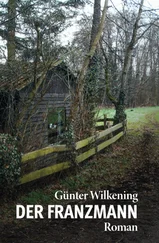George Gemünder - George Gemünder's Progress in Violin Making
Здесь есть возможность читать онлайн «George Gemünder - George Gemünder's Progress in Violin Making» — ознакомительный отрывок электронной книги совершенно бесплатно, а после прочтения отрывка купить полную версию. В некоторых случаях можно слушать аудио, скачать через торрент в формате fb2 и присутствует краткое содержание. Издательство: Иностранный паблик, Жанр: foreign_antique, foreign_prose, на английском языке. Описание произведения, (предисловие) а так же отзывы посетителей доступны на портале библиотеки ЛибКат.
- Название:George Gemünder's Progress in Violin Making
- Автор:
- Издательство:Иностранный паблик
- Жанр:
- Год:неизвестен
- ISBN:нет данных
- Рейтинг книги:3 / 5. Голосов: 1
-
Избранное:Добавить в избранное
- Отзывы:
-
Ваша оценка:
- 60
- 1
- 2
- 3
- 4
- 5
George Gemünder's Progress in Violin Making: краткое содержание, описание и аннотация
Предлагаем к чтению аннотацию, описание, краткое содержание или предисловие (зависит от того, что написал сам автор книги «George Gemünder's Progress in Violin Making»). Если вы не нашли необходимую информацию о книге — напишите в комментариях, мы постараемся отыскать её.
George Gemünder's Progress in Violin Making — читать онлайн ознакомительный отрывок
Ниже представлен текст книги, разбитый по страницам. Система сохранения места последней прочитанной страницы, позволяет с удобством читать онлайн бесплатно книгу «George Gemünder's Progress in Violin Making», без необходимости каждый раз заново искать на чём Вы остановились. Поставьте закладку, и сможете в любой момент перейти на страницу, на которой закончили чтение.
Интервал:
Закладка:
George Gemünder
George Gemünder's Progress in Violin Making / With Interesting Facts Concerning the Art and Its Critics in General
BIOGRAPHY OF GEORGE GEMÜNDER
George Gemünder was born at Ingelfingen, in the kingdom of Wurtemburg, on the 13th of April, 1816.
His father was a maker of bow instruments, and it was, therefore, from Gemünder's earliest youth that he devoted himself to the same art and the studies connected with it.
When he left school, it was suggested to his father that George should become a school-master, as he at the time wrote the finest hand and executed the best designs of any among his classmates. His father was not averse to this proposal and decided to carry it out. George was, accordingly, directed to prepare for the seminary. The plan was not, however, in accordance with his own tastes or inclinations, and he followed it for a period of but three weeks, only to abandon it finally and forever, to take up that employment which accorded with his natural gift and gave scope for the development of his genius.
After his father's death, which occurred when George was in his nineteenth year, he went abroad, and worked variously at Pesth, Presburg, Vienna and Munich. Fortune smiled upon him, and more than once an opportunity was presented of establishing a business; but nothing that promised simply commonplace results and a commonplace life could attract his eye, since his mind, aspiring to improvement in his art, was constantly impelling him toward that celebrated manufacturer of violins, Vuillaume, at Paris. He plainly saw that in Germany he could not reach in the art that degree of accomplishment for which he strove, and, therefore, he resolved to find, if possible, at Strasburg, such a position as he had had at Munich. Through the mediation of a friend he obtained a call to go to a manufacturer of musical instruments at Strasburg; but upon his arrival he was astonished to learn that the man was a maker of brass instruments! Here was a dilemma. Disappointed in his effort to find employment, winter at the door and far away from home, what could he do? The manufacturer, whose name was Roth, perceiving his perturbation, was kind enough to ask Gemünder to remain in his house until he should have succeeded in finding such a position as he desired. Gemünder accepted the profered kindness, and after the lapse of six weeks he formed the acquaintance of a gentleman with whom he afterward became intimate, and who promised to write for Gemünder a letter of recommendation and send it to Vuillaume at Paris. Meanwhile Gemünder remained in Strasburg. One day, while taking a walk in the park called "Die Englishen Anlagen," he seated himself on a bench and shortly fell asleep. In his sleep he heard a voice which seemed to say: "Don't give way; within three days your situation will change!" The voice proved prophetic, for on the third day after the dream his friend came to him with a letter from Vuillaume, which contained the agreeable intelligence that Gemünder should go to Paris. The invitation was promptly accepted and Gemünder immediately started on his journey. When he arrived at Vuillaume's another difficulty was encountered, for Vuillaume had mistakenly supposed that Gemünder spoke French. By mere good fortune it happened at the time of Gemünder's arrival that a German professor was giving music lessons to Vuillaume's twin daughters, who in the capacity of interpreter informed Gemünder that M. Vuillaume was sorry to have induced him to come to Paris, because it would be impossible to get along in his house without French. Vuillaume kindly offered to pay Gemünder's traveling expenses from Paris back to Strasburg, but said, however, that should the latter be satisfied with nominal wages at first, he would give him thirty sous a day until he should have learned enough of the language to be able to get along. Gemünder accepted the proposition, which greatly astonished Vuillaume because he had not supposed that Gemünder would be contented with such small wages! Then he showed him a violin and violoncello as models of his manufacture, and asked him if he could make instruments like those. The answer being in the affirmative, Vuillaume smiled, for he was sure it could not be done. On the following day he provided Gemünder with materials for making a new violin, in order to see what he could do. He soon perceived that Gemünder possessed more theoretical than practical knowledge. When the violin was finished, he made him understand that their way of working was different, and he desired to have his own methods adopted. Gemünder did his best, and being a good designer, he soon acquired a knowledge of the different characters of the propagated Italian school in regard to the construction of violins.
After the lapse of three months Gemünder's wages were increased ten sous a day, and although he now saw his most heartfelt desire fulfilled, namely, to work in Vuillaume's manufactory, yet he did not find it possible to stay there permanently, because his fellow-workmen, who had observed the kindness with which their employer had treated his new workman, became filled with feelings of jealousy, and resolved to harrass him and compel him if possible to leave. So thoroughly did they succeed in embittering his life, that Gemünder finally resolved to leave Vuillaume and go to America, and with this firmly fixed in his mind he began his preparations secretly to carry out his plan.
When everything was ready, he went to Vuillaume to make known his intention and to explain to him the cause of his leaving. The latter, astonished at this intelligence, declared that Gemünder should not leave his house at all, and assured him that he would not meet with further unkindness from his fellow-workmen, even if all should be dismissed, although some of them had already been in his manufactory for many years. He further assured Gemünder that should he not desire to remain in Paris, he would establish him in a business similar to his own, either in Germany or elsewhere, but he dissuaded him from going to America, for the reason that the art of violin making was not sufficiently understood there at that time. This kindness and benevolence upon the part of his employer so touched his heart that he was constrained to remain, and he began to construct new violins, in some of which he imitated the Italian character thoroughly, and also to repair injured violins.
One day Vuillaume handed Gemünder a violin, with the remark that he wished him to do his best work in repairing it, for a gentleman from Russia had sent it. Vuillaume especially called Gemünder's attention to a certain place in the back which was to be repaired, which was almost invisible, and he gave Gemünder a magnifying glass for his assistance, but Gemünder returned it, saying that he could do better with his naked eyes, and when finished Vuillaume might examine it with the glass. When completed, the work proved to be all that Vuillaume had wished, and satisfied the owner of the instrument so thoroughly that in his ecstasy of delight he presented Vuillaume, in addition to the payment for his work, with a costly Russian morning gown.
On the return of Ole Bull from America, in 1845, that distinguished performer brought his wonderful "Caspar da Salo" violin to Vuillaume to be repaired, and requested the latter to do the work himself, as it was something about which he was very particular; but Vuillaume answered that he had a German in his workshop who could do it better than he. Impelled by curiosity to become acquainted with this German, he asked to be shown to the place. After some conversation, Gemünder undertook the repairing of the violin and completed it in as masterly a manner as he did in the case of the Russian gentleman.
After an interval of three years, while Gemünder was still working at Vuillaume's, the latter showed him a violin and asked his opinion about it. Gemünder, having examined it, replied that it was made by some one who had no school! "I expected to hear this," returned Vuillaume, "and now let me tell you, that this violin is the very same that I engaged you to make when you came to me. I show it only that you may recognize what you are now and what you were then !" Gemünder was not only surprised, but amazed, and would hardly have believed it possible. This incident is only mentioned to show that as long as the eye has not been fully cultivated, those who fancy themselves to be artists are not such, and in reality they cannot distinguish right from wrong. Gemünder has often experienced this in America. He knows no other violin maker who deserves to be compared with Vuillaume in this respect, for he correctly understood the character of the outline and form as well as the interior structure of the different Italian instruments.
Читать дальшеИнтервал:
Закладка:
Похожие книги на «George Gemünder's Progress in Violin Making»
Представляем Вашему вниманию похожие книги на «George Gemünder's Progress in Violin Making» списком для выбора. Мы отобрали схожую по названию и смыслу литературу в надежде предоставить читателям больше вариантов отыскать новые, интересные, ещё непрочитанные произведения.
Обсуждение, отзывы о книге «George Gemünder's Progress in Violin Making» и просто собственные мнения читателей. Оставьте ваши комментарии, напишите, что Вы думаете о произведении, его смысле или главных героях. Укажите что конкретно понравилось, а что нет, и почему Вы так считаете.












